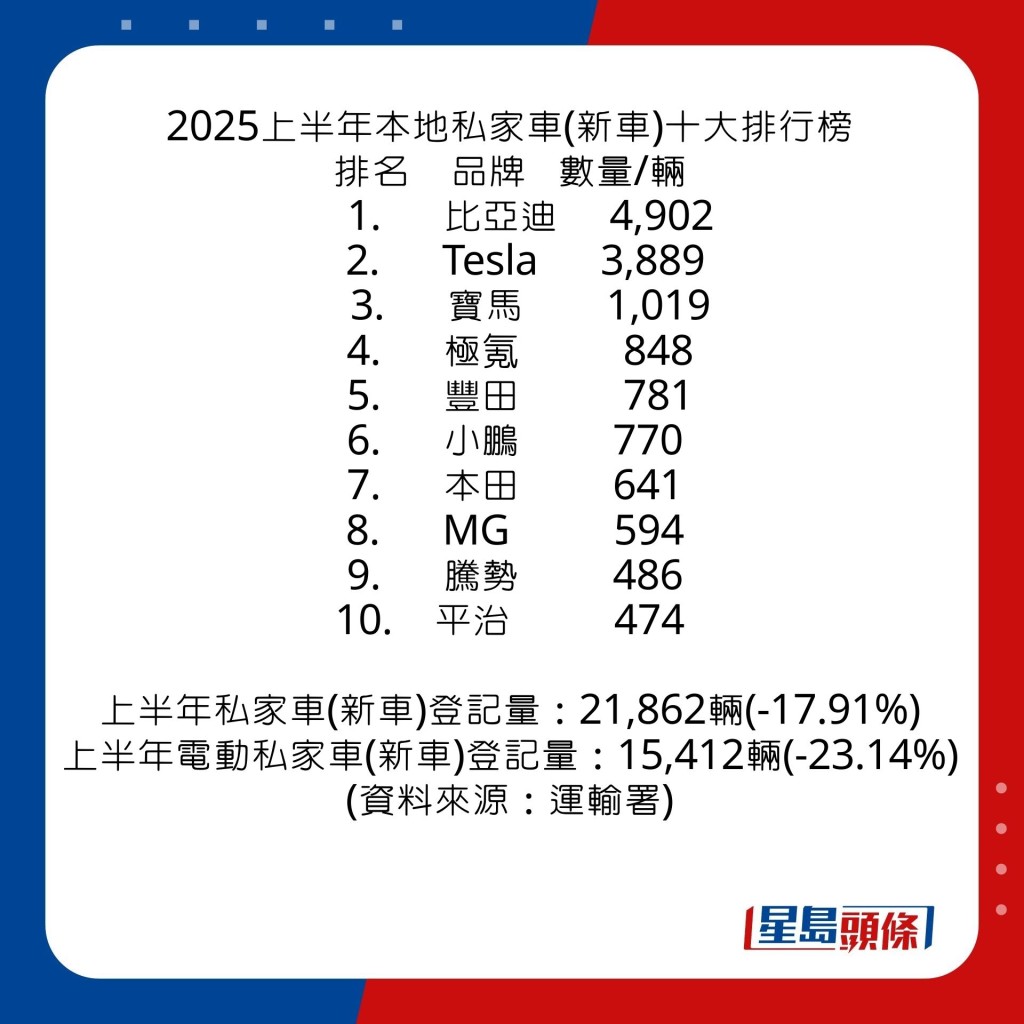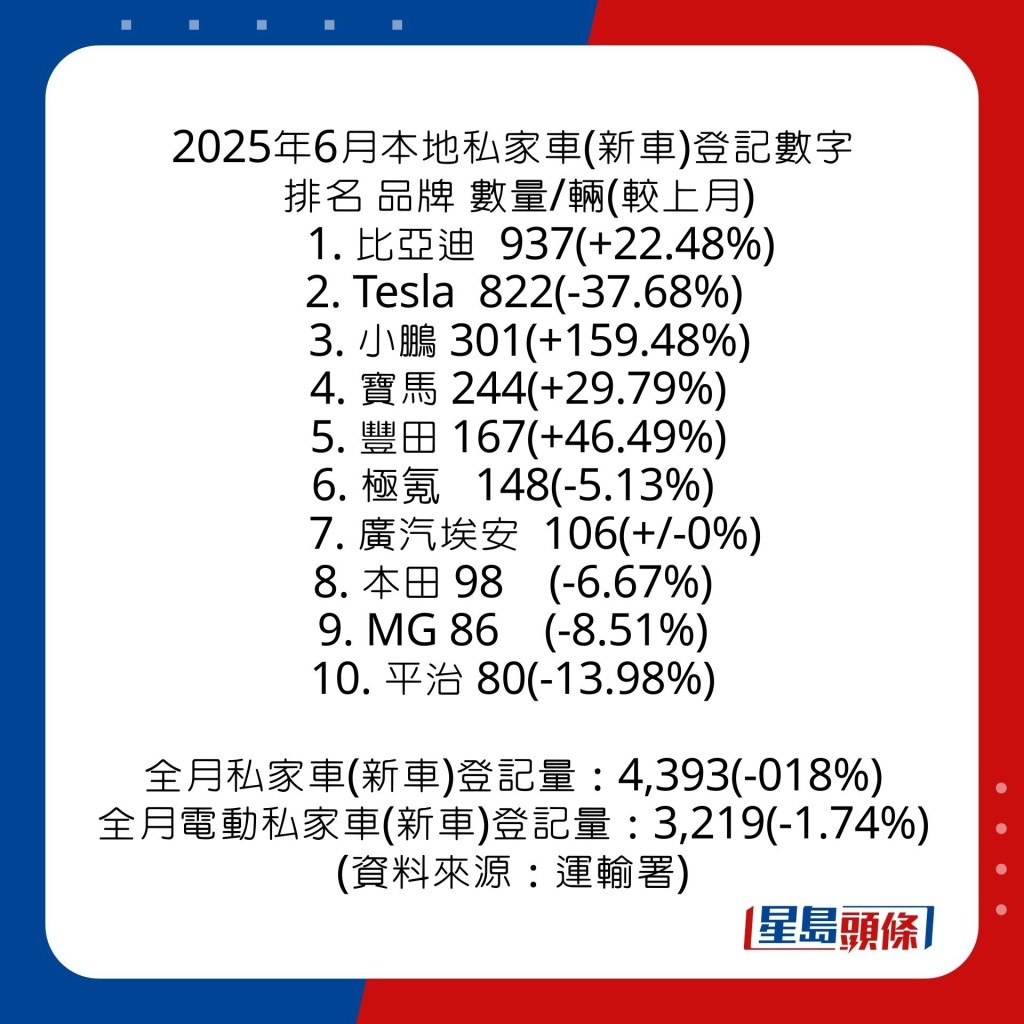港府擬11月實施粵車南下 初期入市區名額每日100個
政府計劃11月實施粵車南下,當中入境市區名額每日100個,每次可逗留三日。每次赴港前需要預約出行,並依照預約日期出行到港。 運輸及物流局向立法會提交文件,提到希望在11月容許粵車經港珠澳大橋來港,前往人工島自動化停車場泊車後經機場轉機或入境,會先啟用轉機停車場約1,800個泊位。
詳情請參閱原文:Yahoo!News
政府計劃11月實施粵車南下,當中入境市區名額每日100個,每次可逗留三日。每次赴港前需要預約出行,並依照預約日期出行到港。 運輸及物流局向立法會提交文件,提到希望在11月容許粵車經港珠澳大橋來港,前往人工島自動化停車場泊車後經機場轉機或入境,會先啟用轉機停車場約1,800個泊位。
詳情請參閱原文:Yahoo!News
環境及生態局局長謝展寰表示,本港現時有13萬部電動車,新落地私家車中,電動車佔七成,目前有12萬個充電車位,有信心能夠在2027年增至20萬個,並正在推行總值3億元的資助計劃,鼓勵市場加設高速充電椿,目標是增設3千個,能夠額外支援16萬部車輛使用。
謝展寰在本台節目指,電動車電池退役既是需要處理的問題,亦都是機遇,可望成為新的經濟增長點,目前已有回收公司正在環保園,建立全港以至大灣區內,首個電動車電池回收設施,預計明年上半年落成啟用,每年能夠處理一萬噸電池,期望日後能夠令香港成為處理中心,支援大灣區、亞洲,以及全球其他地方。
詳情請參閱原文:新城財經
在香港,駕車隨時遇到馬路垃圾,大的可能釀成意外,小的亦可能損毁車輛,情況有多普遍呢?法例規定,司機須確保貨物適當地固定或盛載在車上,現時執法是否足夠呢?
詳情請參閱以下連結:TVB
Tesla 正式推出全新 Model Y Standard 及 Model 3 Standard,這兩款入門版本可說是品牌歷來最親民的選擇,兼具高效能與極致安全工程,同時擁有極低的持有成本,成為電動車入門用家的理想之選。
新版本擁有 321 英里(約 517 公里) 續航力,具備極高能源效率,既可行得更遠,又能節省使用成本。車輛維護需求極低,加上支援 FSD(全自動駕駛)監督模式,進一步提升駕駛體驗與安全保障。
詳情請參閱原文:Car1.HK
環境及生態局長謝展寰 10月4日 提及當局已促成本地公司在環保園回收園裏建設電池回收設施,有望明年落成後可回收退役電池,冀香港成為電動車電池收集中心,供內地提煉稀有金屬,帶動產業及就業;又提到環保園首間紙漿廠料年底運作,望能處理所有種類廢紙。
原文網址:明報
美國電動車補貼於九月完結,消費者提前買車,刺激美國第三季電動車銷量,有望創季度新高。
當中,福特汽車季內共賣出85,789輛電動化汽車,按年增長近兩成,其中混能車賣出逾5.5萬輛,純電動車就賣出逾3萬輛。
至於通用汽車,季內賣出66,501輛電動車,創單季新高。今年以來共賣出逾14萬輛電動車,按年增長逾一倍。公司估計,受惠於電動車銷量提升,全個行業季內共賣出1,670萬至1,690萬輛車,高於之前的行業預測。
詳情請參閱原文:TVB News
中國商品向來追求「平靚正」,不論是在國內市場還是出口,企業均延續低價策略。當中國企業以為自己正在全球作出貢獻時,最終卻變成「感動自己惡心別人」的行為,各國紛紛對中國商品加徵關稅。中國商務部長王文濤近日在紐約出席活動時,便向中資企業發出肺腑之勸,要求停止「內捲外化」,不要把國內的降價策略帶到美國市場。 …
詳情請參閱原文:信報
Tesla公司副總裁陶琳早前在微博上分享了兩個案例,打消了很多人對電池衰減的擔心。她表示,最近看到澳洲的車主分享:他的Model 3原裝電池電機跑了41萬公里,電池衰減僅約11%。國內也有Model Y車主曬出3年17.5萬公里,電池健康度還在94%。
詳情請參閱原文: 香港01
政府正推動全港首間大型電動車電池回收設施,預計2026年上半年在環保園啟用。本地退役電池將轉化為再生黑粉供應內地和周邊地區,促進電動車電池回收產業發展。
詳情請參閱原文:HKET
運輸署剛公布6月份本地車市統計數字,簡接也派發了2025上半年本地車壇成績表。今年1至6月香港累計私家車新車登記總數21,862輛,較2024年同期(26,632輛)減少17.91%,電動車佔比率為70.5%(15,412輛),同比亦回落4.79%。車市呈現微調,但整體表現依然平穩健康,其中國產電動車比亞迪(BYD)延續強勢,今年上半年及6月份交投量皆排名第一,首度成為「雙冠王」。


詳情請參閱原文 : 星島頭條